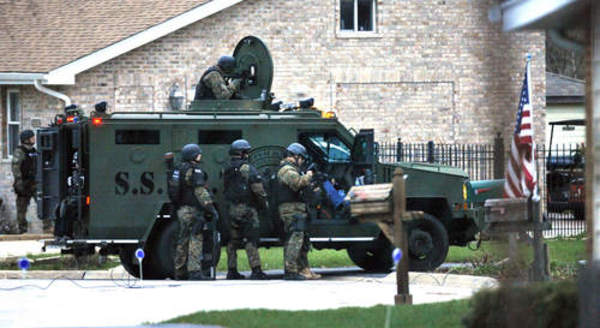Even before we knew the details surrounding the death of Osama bin Laden, his demise was being hailed as the “end of an era.” The Global War on Terrorism, which we’ve been fighting for the last decade in several theaters simultaneously, has been defined in terms of catching and killing this iconic figure. Now that he’s dead – with the US reportedly in possession of the body – can we declare victory and go home?
Of course not. You didn’t think the Powers That Be would let us get off quite so easily, now did you?
In his speech to the nation, the President twice cautioned that this doesn’t mean the end of the fight, and the pundits have followed through, declaring that “of course” the battle isn’t over. Aside from all the chest-thumping and victorious howling rising from the crowds, and the politicians who delude them, the sudden absence of this devil figure — this looming spectral threat perpetually lurking somewhere in the shadows – leaves a gaping hole in the rationale for our eternal “war on terrorism.” A new devil will no doubt be found, but there aren’t many credible candidates, or at least none with the penumbra of menace surrounding the founder of al-Qaeda.
Bin Laden’s demise delivers a smashing blow to al-Qaeda – and, perhaps, a fatal one. For the succession to the leadership is now up for grabs, and this is one situation the jihadists have never had to face. Beheaded, the organization could very well be torn apart by an internal struggle, with various factions vying to claim the al-Qaeda franchise.
Even as we hear the familiar chants of “USA! USA!” and the talking heads on television assure us that this is the proof that we’re still No. 1, the political implications of this event do not bode well for the War Party.
A war-weary American public is preoccupied with issues of internal decline, and is no longer so easily frightened. The idea that we have to keep fighting in Afghanistan to destroy a leaderless and demoralized organization is not going to resonate. Al-Qaeda faces not only the death of its leader and founder, but the discovery of a massive organizational headquarters, no doubt filled with intelligence about the terrorist network, in effect has sounded al-Qaeda’s death knell. Sure, they may launch new attacks in an effort to show they’re still a force to be contended with, but these amount to the death rattle of the organization, as it splinters and falls to pieces.
What’s interesting is that the compound where bin Laden was hiding wasn’t in Waziristan, the “tribal” wildlands of Pakistan, but rather in Abbottabad, which is being described as an affluent suburb of Islamabad, the Pakistani capital. Although the President credited the Pakistanis with providing the initial tip that led to bin Laden’s death in a raid by US Special Forces, the fact that Abbottabad is known as a military town, the prime base of the Pakistan security forces – and that bin Laden was hiding in their very midst – is bound to cause friction between the two countries. The logical question is: how could the Pakistanis not have known? After all, the compound where bin Laden had taken refuge wasn’t exactly unobtrusive: eight times bigger than any structure in the area, and surround by extraordinary security – a high wall topped with barbed wire, no doubt manned by guards – it would have been hard to miss.
All that aside, however, the death of al-Qaeda’s founder, the author and chief perpetrator of the worst terrorist attack in US history, marks the end of what was, essentially, a war of vengeance. With bin Laden gone, the target of our rage is gone, and the desire for revenge sated. Our leaders are already telling us that this is no time to relax our efforts, but the missing emotional charge of invoking the terrorist leader’s name will let much of the air out of War Party’s tires.
As a war-weary nation confronts the fact of its own bankruptcy, and faces internal problems the severity of which can no longer be denied, a war they told us was going to be “generational” at the very least is coming to an end – without anything really to show for it except the dead body of a single man, which we will now display to the world in a primitive demonstration of American power.
If the death of bin Laden can be counted a “victory” in the war on terrorism, then surely it is a Pyrrhic one. For all the chauvinistic posturing and the President’s invocation of the vaunted “unity” that supposedly blessed us in the wake of 9/11, the costs of pursuing and killing the terrorist leader have been dear. Bin Laden, in one of his messages, once boasted that he would bankrupt America, and indeed his prophecy is in the process of coming true. In response to 9/11, we launched two major wars and several less obtrusive military operations, rampaging through the Middle East and reaching deeply into Central Asia. It took us ten years, and trillions of dollars, to track down and eliminate a single man. Although we eventually got our man, who was the real winner in this battle?
In response to the events of September 11, I wrote a column entitled “Kill ’em — and get out!” Well, now we’ve killed him — and it’s time to bring the troops home, now.




